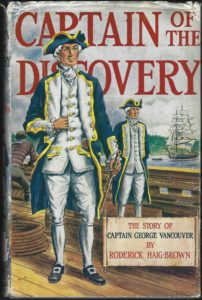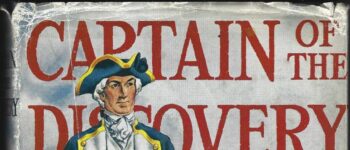1791: The Vancouver Expedition
November 2, 2021
By AHNZ

At 9pm on Wednesday 2nd November, 1791, Captain George Vancouver’s Expedition anchored at Dusky Sound. They explored, recovered, and interacted with the local Maoris. Vancouver knew the way having been here before under the command of Captain James Cook but this time he was the master and had two ships to command, HMS Chatham and HMS Discovery.
The Expedition, ex-New Holland (Australia,) stayed until 21 November when they continued on for the Pacific Islands then North America. On the way the Chatham Islands were discovered.
Vancouver found New Zealand part of the Pacific World and made it part of the Western World. What the Expedition called a “sea-bear” would very soon become more properly recognised as a fur seal and a very great extractive industrial boom resulted. Vancouver found Maoris an insular people fighting among themselves but left them ‘on the map’ to become part of the international community as valued able seamen who sailed the oceans of the world.
James Cook’s 1773 expedition had mapped part of Dusky Sound ‘Nobody Knows What’ but Vancouver’s showed homage (“conformity”) and a sense of humor in re-dubbing it ‘Somebody Knows What’. Ref. New Zealand: History & Natural History, Facebook (2015)
Here are some of the interesting New Zealand events as recorded by Vancouver and Vancouver (1801) in A Voyage of Discovery to the North Pacific Ocean And Round the World….
Sunday 13 November
After settling in and all hands working hard, despite windy conditions, Vancouver is able to take an Away Team to explore.
“By Sunday the 13th, the necessary operations were in such a state of forwardness, as to allow a large party of officers and gentlemen in two boats, accompanied by Mr. Broughton in the Chatham’s cutter, to attend me on an excursion over this spacious bay, with hope of becoming acquainted with some of the inhabitants; and if circumstances permitted, to explore the upper part of the northern arm, which by Capt. Cook was called, “No Body Knows What,” and the only part he did not thoroughly examine.”
Monday 21st November
Chatham and Discovery exit Dusky, having taken with them some “tea plant” for brewing at sea. Manuka, I presume. Many were sick and weak by dysentery upon arrival but by the time of going to sea the whole crew was well again. Vancouver also gathered some wild fowl (weka?) but discovered no trace of the geese he and Cook had left behind 20 years prior.
Tuesday 29th November
Chatham Islands anniversary day was set when the Expedition, by chance of being blown by storm, discovered these islands on 29 November. By invitation of the Moriori, the Expedition landed. The Expedition then proceeded to claim the land for the King..”..we displayed the Union flag, turned a turf, and took possession of the island; which I named CHATHAM ISLAND, (in honor of the Earl of Chatham,) in the name of His Majesty King George the Third; under the presumption of being the first discoveries. After drinking his Majesty’s health, I nailed a piece of lead to a tree near the beach , on which was inscribed,…” If only we still had that historic lead plate and the bottle containing the same words in our national treasure.
The Expedition made observations about the native’s nets and their basic two or three-man canoes. No huts were discovered but some very comfortable fort dwellings created by trees trained as saplings to enclose a shelter evidently used for sleeping in. The friendly Moriori rubbed noses with Vancouver’s people.
One Moriori, who had traded a spear, was exchanged a mirror for a “sea-bear skin coat.” The New Zealander was “so delighted with the reflection of his face in the looking glass provided in exchange, that he ran away with them [both!] These natives did not appear to understand barter or trade at all.
“…with a view to show them the superior effect of our fire-arms, I gave them some birds which I had killed, and pointed out to them the cause of their death. On firing my gun they seemed much alarmed at its report; and all retreated as we advanced toward them, excepting one old man, who maintained his ground.”
The New Zealanders seemed to know enough to be afraid of guns when they were shown a demonstration and to covert one for themselves saying “Toohata, toohata” over and over. Where others backed off, one contagious elder offered the visitors a stomping and chanting challenge. The English interrupted this by passing away his gun and teaching the native to shake hands and use other body language to make friendly which was a temporary success.
The Moriori had huge spears, bludgeons, and were adept at making fire. They also appear to have as their top weapon some form of stone-thrower which came close to being employed in the above incident. Unfortunately, things did turn sour and the New Zealanders attacked the superior British which cost the natives one life..
“As we retired, we perceived one of the natives return from the woods, whither all had retreated, and placing himself by the deceased, he was distinctly heard in a fort of dismal howl to utter his lamentations…”I have to lament that the hostility of its inhabitants rendered the melancholy fate that attended one of the unavoidable, and prevented our researches extending further than the beach, and the immediate entrance of the adjoining wood.”
– “In a misunderstanding with the ship’s crew, a Moriori man named Tamakaroro was shot..The elders believed Moriori were partly responsible and devised an appropriate ritual for greeting visitors in future.”- Ref. Te Ara
I’m not sure how Te Ara found out the name of the first Moriori killed by gun or that his people adjusted their culture to take responsibility for the death. If true it’s an early indication of a race that had a huge Agreeableness personality trait that would become their undoing when next they met the Maoris.
2 thoughts on "1791: The Vancouver Expedition"
Leave a Reply
 Like Comment Share
Like Comment Share






Interesting as we only concentrate on Cook